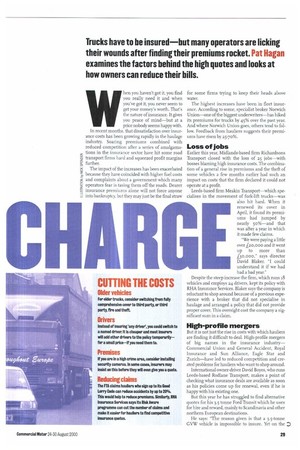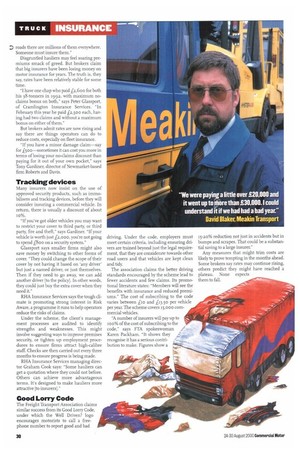Trucks have to be insured but many operators are licking
Page 31

Page 32

If you've noticed an error in this article please click here to report it so we can fix it.
their wounds after finding their premiums rocket. Pat Hagan examines the factors behind the high quotes and looks at how owners can reduce their bills.
VWhen you haven't got it, you find you really need it and when you've got it, you never seem to get your money's worth. That's the nature of insurance. It gives you peace of mind—but at a price nobody seems happy with. In recent months, that dissatisfaction over insurance costs has been growing rapidly in the haulage industry. Soaring premiums combined with reduced competition after a series of amalgamations in the insurance sector have hit some road transport firms hard and squeezed profit margins further.
The impact of the increases has been exacerbated because they have coincided with higher fuel costs and complaints about a government which many operators fear is taxing them off the roads. Dearer insurance premiums alone will not force anyone into bankruptcy, but they may just be the final straw for some firms trying to keep their heads above water.
The highest increases have been in fleet insurance. According to some, specialist broker Norwich Union—one of the biggest underwriters—has hiked its premiums for trucks by 45% over the past year. And where Norwich Union goes, others tend to follow. Feedback from hauliers suggests their premiums have risen by 25-70%.
Loss of jobs
Earlier this year, Midlands-based firm Richardsons Transport closed with the loss of 25 jobs—with bosses blaming high insurance costs. The combination of a general rise in premiums and the theft of some vehicles a few months earlier had such an impact on costs that the firm declared it could not operate at a profit.
Leeds-based firm Meakin Transport—which specialises in the movement of fork-lift trucks—was also hit hard. When it renewed its cover in April, it found its premiums had jumped by nearly 50%—and that was after a year in which it made few claims.
"We were paying a little over 12 0,0 oo and it went up to more than £30,000," says director David Blaker. "I could understand it if we had had a bad year."
Despite the steep increase the firm, which runs 18 vehicles and employs 24 drivers, kept its policy with RHA Insurance Services. Blaker says the company is reluctant to shop around because of a previous experience with a broker that did not specialise in haulage and arranged a policy that did not provide proper cover. This oversight cost the company a significant sum in a claim.
High-profile mergers
But it is not just the rise in costs with which hauliers are finding it difficult to deal. High-profile mergers of big names in the insurance industry— Commercial Union and General Accident, Royal Insurance and Sun Alliance, Eagle Star and Zurich—have led to reduced competition and created problems for hauliers who want to shop around.
International owner-driver David Boyes, who runs Leeds-based Rodlane Transport, makes a point of checicing what insurance deals are available as soon as his policies come up for renewal, even if he is happy with his existing one.
But this year he has struggled to find alternative quotes for his 3.5 tonne Ford Transit which he uses for hire and reward, mainly to Scandinavia and other northern European destinations.
He says: "The reason given is that a 3.5-tonne GVW vehicle is impossible to insure. Yet on the
3 roads there are millions of them everywhere. Someone must insure them."
Disgruntled hauliers may feel soaring premiums smack of greed. But brokers claim that big insurers have been losing money on motor insurance for years. The truth is, they say, rates have been relatively stable for some time.
"I have one chap who paid £2,600 for both his 38-tonners in 1992, with maximum noclaims bonus on both," says Peter Glassport, of Crarnlington Insurance Services. "In February this year he paid L2,5oo each, having had two claims and without a maximum bonus on either of them."
But brokers admit rates are now rising and say there are things operators can do to reduce costs, especially on fleet insurance.
"If you have a minor damage claim—say for oo—sometimes it can cost you more in terms of losing your no-claims discount than paying for it out of your own pocket," says Tony Gardiner, director of Newmarket-based firm Roberts and Davis.
Tracking devices
Many insurers now insist on the use of approved security products, such as immobilisers and tracking devices, before they will consider insuring a commercial vehicle. In return, there is usually a discount of about o%.
"If you've got older vehicles you may want to restrict your cover to third party, or third party, fire and theft," says Gardiner. "If your vehicle is worth just i2,000, you're not going to spend goo on a security system."
Glassport says smaller firms might also save money by switching to other forms of cover. "They could change the scope of their cover by not having it based on 'any driver' but just a named driver, or just themselves. Then if they need to go away, we can add another driver [to the policy]. In other words, they could just buy the extra cover when they need it."
RHA Insurance Services says the tough climate is promoting strong interest in Risk Aware, a programme it mns to help operators reduce the risks of claims.
Under the scheme, the client's management processes are audited to identify strengths and weaknesses. This might involve suggesting ways to improve premises security, or tighten up employment procedures to ensure firms attract high-calibre staff. Checks are then carried out every three months to ensure progress is being made.
RHA Insurance Services managing director Graham Cook says: "Some hauliers can get a quotation where they could not before. Others can achieve more advantageous terms. It's designed to make hauliers more attractive [to insurers]."
Good Lorry Code
The Freight Transport Association claims similar success from its Good Lorry Code, under which the Well Driven? logo encourages motorists to call a freephone number to report good and bad driving. Under the code, employers must meet certain criteria, including ensuring drivers are trained beyond just the legal requirement, that they are considerate towards other road users and that vehicles are kept clean and tidy.
The association claims the better driving standards encouraged by the scheme lead to fewer accidents and few claims. Its promotional literature states: "Members will see the benefits with insurance and reduced premiums." The cost of subscribing to the code varies between £m and £13.50 per vehicle per year. The scheme covers 15,00o commercial vehicles.
"A number of insurers will pay up to r00% of the cost of subscribing to the code," says FTA spokeswoman ,/
Karen Packharn. "It shows they 4 .A•lifitt" recognise it has a serious contri bution to make. Figures show a 15-20% reduction not just in accidents but in bumps and scrapes. That could be a substantial saving to a large insurer."
Any measures that might trim costs are likely to prove tempting in the months ahead. Some brokers say rates may continue rising, others predict they might have reached a plateau. None expects them to fall.








































































































